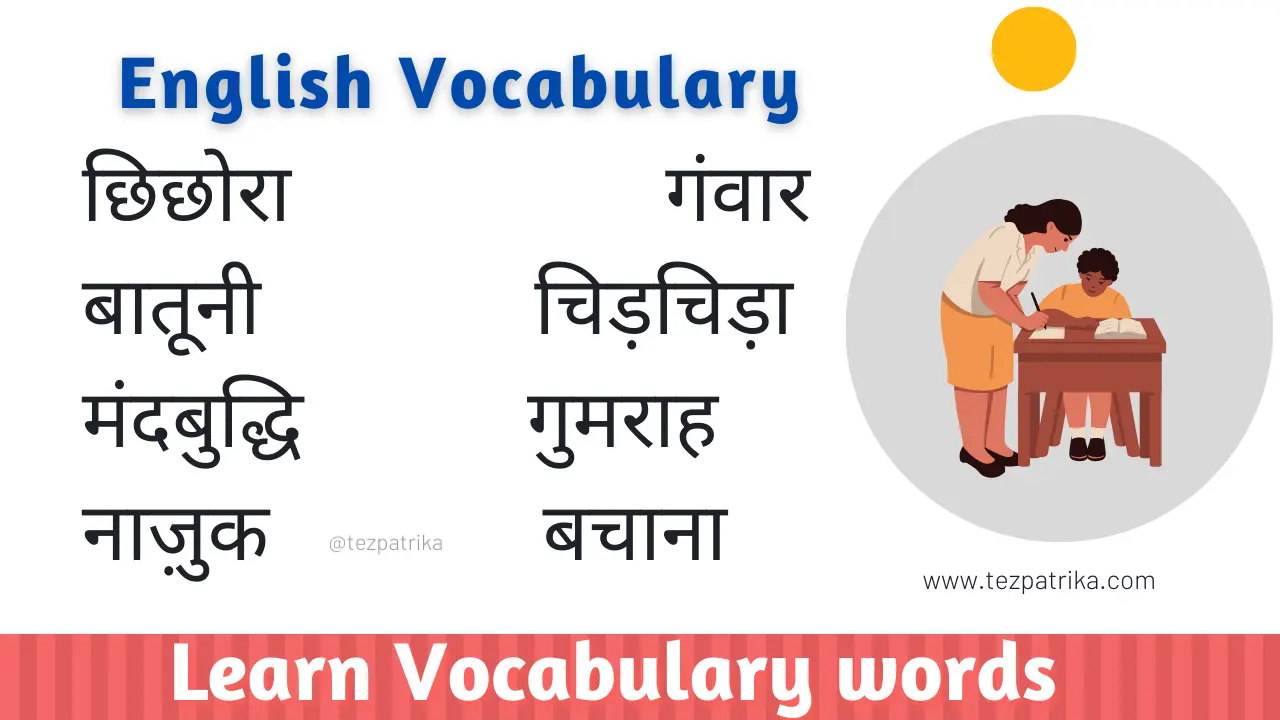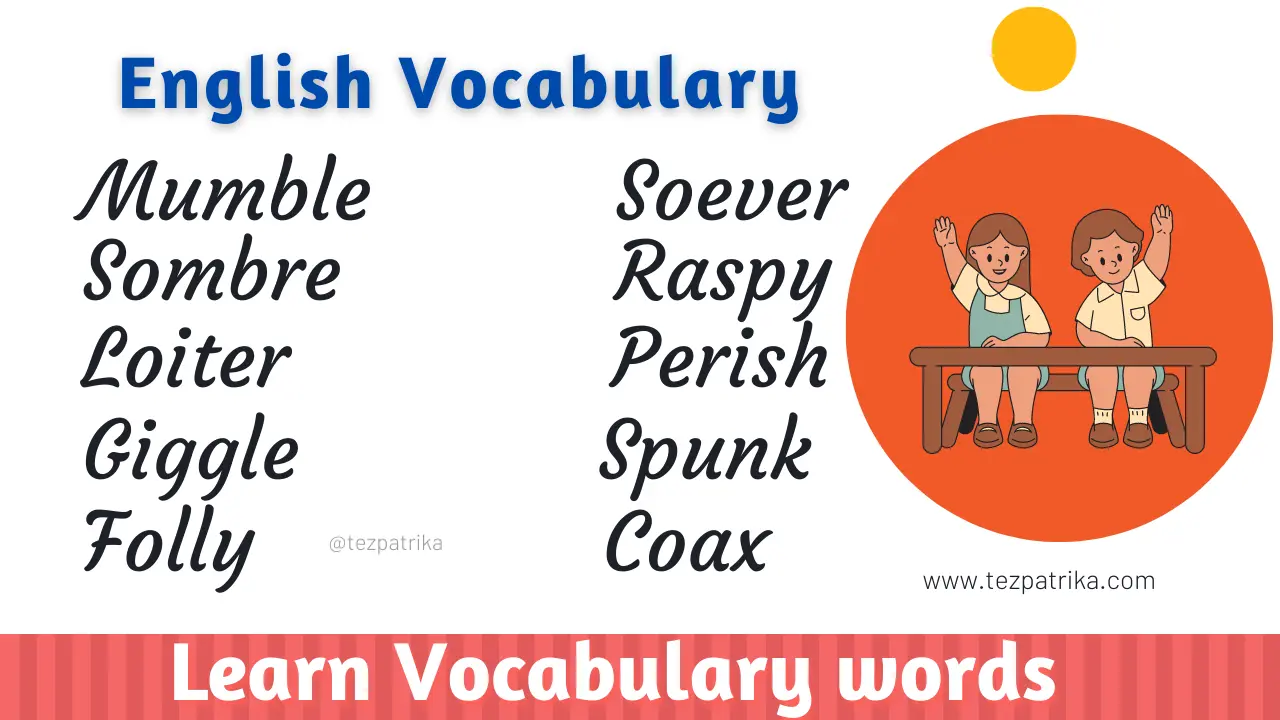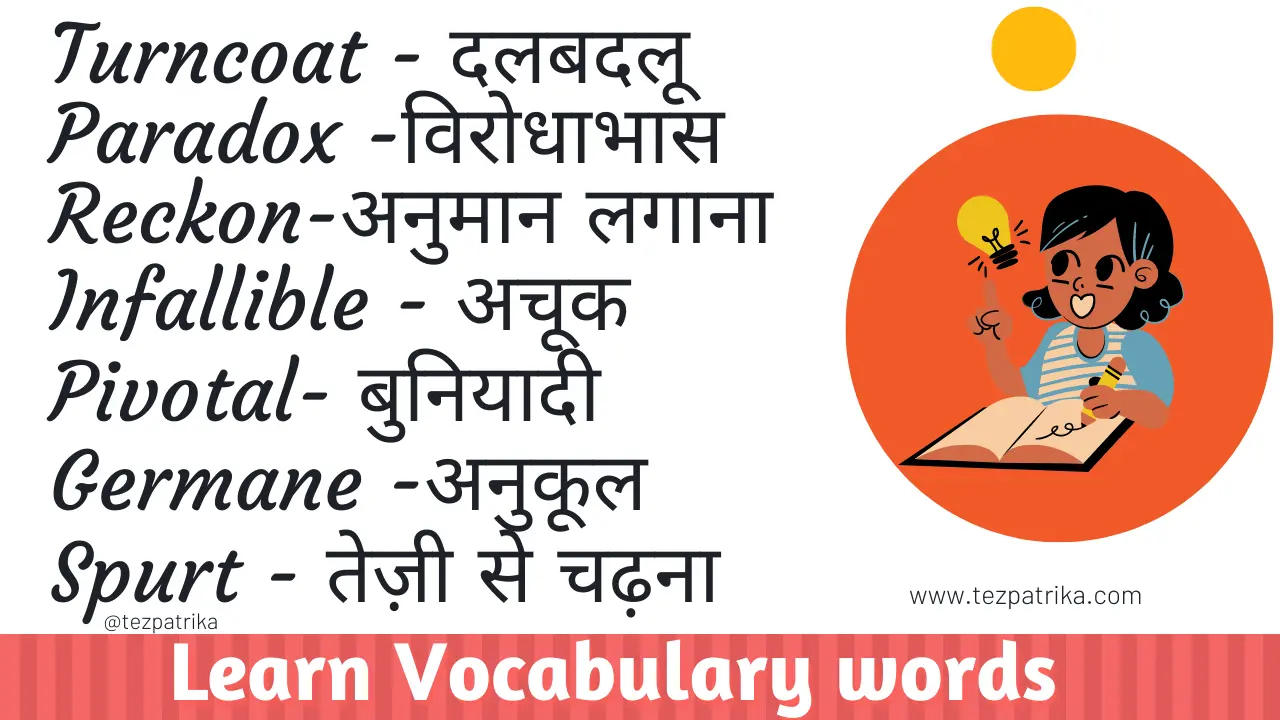- ;
What act means in hindi, act meaning in Hindi and English, act ka hindi matlab, act definition in hindi and English, What is meaning of act in hindi, know the meaning of act word from this page in hindi and English.
Meaning and definitions of act, translation in hindi language for act with similar and opposite words presented by www.tezpatrika.com
Tezpatrika.com, Hindi English Dictionary will assist you to know the meaning of words from English to Hindi alphabets. Usage of a dictionary will help you to check the translation in Hindi, synonyms, antonyms and similar words which will help in bringing up the vocabulary.
One of the widely spoken languages across the globe is English. Especially English language becomes common and connects people across the globe with each other. English is the 2nd Language learned by most of the people.
Hindi languages is one of the oldest language which has roots laid back in around 10th Century AD. One of the Official Language of India is Hindi. It is widely spoken by 10 million people living North Indian States like Delhi, Haryana, Uttar Pradesh, Bihar, Jharkhand, Madhya Pradesh and Parts of Rajasthan. This English to Hindi Dictionary helps you to improve your Hindi as well as English.

Writing essays in English is both very easy and very difficult. It’s difficult if you don’t know how to do it. And it’s easy if you do. In this post, let’s take a look at some essay-writing tips that you can follow if you are an English language student. Mind you, most of the stuff you can follow, even if you want to write in other languages. Let’s get straight into it. Essay writing tips: What you need to do The essay-writing process is typically divided into different parts and phases. For one, there is the research phase, the writing phase, and the checking phase. We’ll talk about some tips that you can follow during research, the actual writing, and so on. 1. Pick the right sources for your research The first step in the process is research. And incidentally, it is also the most important. If you take proper care during the research, you can improve the overall quality of your essay. Of the many things that you have to do for good research, the first thing is to find the right sources for it. The broad criterion that you can set to find “good” sources is to look for the ones that are generally hailed as reliable and authoritative. Think of places like the New York Times website or Forbes. Since we’re talking about writing essays, however, some sources that you can consider using are as follows: 1. Google Scholar – a good place to find academic papers on various topics 2. ResearchGate – pretty much performs the same function as G Scholar 3. JSTOR – same thing once again And so on. Depending on the type of essay you’re writing and the institution you’re associated with, there may be some additional instructions and guidelines that you may have to follow about the research sources. Some institutes may have certain restrictions in place about some research sources, such as Wikipedia, etc. If there are any such restrictions in place, you should take them into consideration before deciding on the sources. 2. Don’t copy-paste from the sources …because that’s plagiarism. Plagiarism is something akin to a disease in academics. Its presence in your essay will only warrant the rejection of the latter. You should never copy-paste anything directly from your research sources, even if it happens to be a single line or sentence. Rather, when taking information from a source, here is what your routine should be. 1. First, you should open multiple sources at a time so that your tone, tenor, and information don’t get influenced 2. When taking information from the sources, you should note them down as points using your own words. This falls within the old “take ideas, not content” advice. 3. Whenever taking information, you should note down the citation details of the sources. Then you should create and add the citations whenever adding the borrowed information. If you note down ideas, you will be able to expound on them without using the same words as the source. This will help you steer clear of plagiarism issues. 3. Keep the essay organized Proper content organization can do wonders for the quality of your essay. An organized essay can look better on the eyes and be generally more readable. Here is what you should do to make your essay organized: 1. Split up the contents using headings and sub-headings 2. Follow a proper progression for the headings, sub-headings and section-headings in the typical cascading format…something that goes like this a. Heading i. Sub-heading 1. Section heading 3. Use bullets to convey information in a more readable way. Things like steps for a process and multiple items are better off written in the form of lists rather than a paragraph. 4. Keep your wording clear Just as proper organization can help with the overall quality and readability of your essay, the same goes for the choice of words you use. Using needlessly difficult words isn’t recommended in any type of content, be it an essay or anything else. Oftentimes, using difficult words can also get you confused about what you want to write. For example, a person describing the inordinate craving for people to utilize recondite terminology with unprecedented fervor…may lose what they’re trying to say in the first place. Of course, other than this, the main benefit of using easy words is that the essay becomes more readable for the reader – who, in this case, can be the teacher or the instructor. To bring them together in the form of a list, here are some tips that you can follow to make your wording easy and simple. 1. Firstly, take care not to use any words that you may think are alien to normal conversation. 2. If the situation demands the use of a difficult word, be sure to address and explain it for the ease of your reader(s). 3. Once you are done writing the draft of your essay, you should give it a couple of thorough reads and re-reads. If you come across any difficult words that you may have used without realizing it, you can fix them then. Another good way to go about the last step there is to use a paraphrasing tool. In other words, if there are some difficult words in your essay and you can’t figure out how to make them more readable, you can try rephrasing those particular parts with the help of a paraphrasing tool. Should you choose a high-quality one, you will be able to get smart results without much need for editing, etc. 5. Find and remove plagiarism Another important thing that you have to do during the essay-writing process is find and remove plagiarism from the content. We don’t need to go on about the harms and consequences of plagiarism. Suffice it to understand that it is one of the worst things that can occur in your academic write-ups. They can get you a low grade, put you in trouble with your teachers and even get you in legal trouble if the offense is serious enough. As we’ve done above, let’s adumbrate the steps that you need to follow for this in points: 1. First, you need to find out the parts of your content that are plagiarized. This you have to do with the help of an online plagiarism checker. There are different plagiarism checkers that you can use; some of the popular ones of which include Copyscape and Check-Plagiarism. 2. Once you are done with the first step, i.e., plagiarism detection, the next thing that follows is the removal or fixing. You can eliminate plagiarism from your content in a few different ways. a. You can just excise the plagiarized parts and cut them out altogether b. If the plagiarism exists in just a few lines or just one of them, you can put it in quotes and make it look like you’ve taken it legally from a source 3. We mentioned paraphrasing above as a way to remedy bad readability. Incidentally, it is a good fix that you can use for plagiarism as well. In other words, you can paraphrase the content that you find to be plagiarized. After being paraphrased, the content will come back new and shining. Conclusion For the sake of brevity, we’re skipping some of the finer details. But we have outlined the main stuff, and you should be good as long as you follow them. Before we give this post the wrap, here are some other additional tips that you can follow to write a good essay. 1. Be sure to check for grammar and spelling errors before finalizing your essay 2. Be sure to add the citations and references properly (if needed) 3. Make sure there are no loose ends with the formatting, i.e., font size, margins, and the like 4. Add graphics and visuals where suitable i.e., for proof and illustration, etc.
Read More
Today we bring some Hindi words which we use daily basis. To know the meaning of these Hindi words you can use in your vocabulary which will help in your communication. Please find Below the List of Hindi Words Meanings: Hindi Word English Word छिछोरा – Foppish गंवार – Rustic बातूनी – Chatty चिड़चिड़ा – Grumpy मंदबुद्धि – Moron गुमराह – Astray नाज़ुक – Brittle बचाना – Shun Hope you remember these words and help to speak in daily communication.
Read More
Today Words of the Day which will help you to build vocabulary and help you to use these words in your daily routine. You can get to know the meaning of the words and improve your communication by using these words. We believe that Learn and implement these words will help you to grow in life. Please find the words with Hindi Meanings as per Below: Ratify – प्रमाणित करना Raze – पूरी तरह नष्ट कर देना Mean – कमीना Mirth – आनन्द Gaunt – भूखा रहकर दुबला होना Frigid – बहुत ठंडा Docile – सीखने योग्य Coarse – मोटा We are bound to improve and provide better results for our users.
Read More
We Bring List of words which will help to build your vocabulary and use in your daily routine. We appreciate to use these words in your daily life. Words with Hindi Meanings as per Below : Mumble – अस्पष्ट बोलना Soever – कोई भी Sombre – उदास Raspy – कर्कश Loiter – आवारा फिरना Perish – खत्म हो जाना Giggle – मंद मंद हँसना Spunk – आकर्षक पुरुष Folly – मूर्खता Coax – फुसलाना We are continue to improve and help you to improve vocabulary.
Read More
Lets Learn few words with Hindi meaning for your exams and try to use in your daily routine. We are trying to help and provide guidance to know meaning and learn new words on daily basis to help and improve English Vocabulary. We are trying those students so that they feel comfortable using these words. Few Words with Hindi Meanings as per Below: 1) Turncoat (Noun) English Meaning – A Dishonest person who changes his/her opinion according to his/her interest. Hindi Meaning – दलबदलू , विश्वासघाती Synonyms – Defector, Betrayer, Deserter, Backslider Antonyms – Follower, Loyalist, Patriot, Companion 2) Paradox (Noun) English Meaning – A statement that contradicts itself. Hindi Meaning – विरोधाभासी Synonyms – Irony, Riddle, Dilemma, Contradiction Antonyms – Reality, Truth, Correction, Accuracy 3 ) Reckon (Verb) English Meaning – Judge to be probable. Hindi Meaning – अनुमान लगाना, आशा करना, समझना Synonyms – Estimate, Consider, Think, Suppose Antonyms – Devote, Neglect, Ponder, Abandon 4) Infallible (Adjective) English Meaning – Incapable of failure. Hindi Meaning – कभी गलती न करने वाला 5) Pivotal (Adjective) English Meaning – Being of crucial importance. Hindi Meaning – निर्णायक Synonyms – Important, Vital, Essential Antonyms – Negligible, Minor, Unimportant 6) Germane (Adjective) English Meaning – Relevant and appropriate. Hindi Meaning – संबन्धित Synonyms – Suitable, Proper, Relevant. Antonyms – Unsuitable, Improper, Irrelevant 7) Spurt (Verb) English Meaning – Sudden Burst. Hindi Meaning – Synonyms – Rush, Flood, Rush Antonyms – Drip, Slump, Trickle
Read More